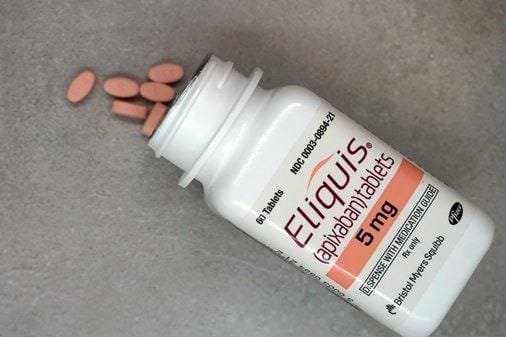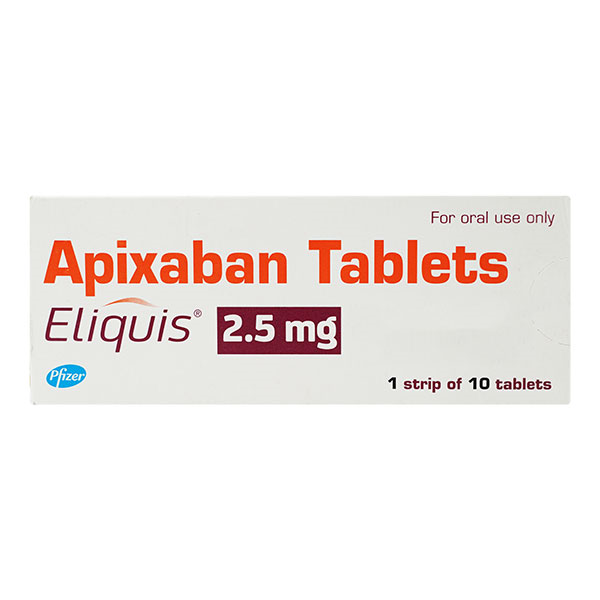Eliquis 2.5 mg Tablet
$357.00 – $954.00
*10 Tablet(s) in a Strip* Mkt: Pfizer Ltd* Country of Origin: India* Delivery charges if applicable will be applied at checkout
INTRODUCTION
ELIQUIS 2.5 MG TABLET contains Apixaban, which belongs to the group of medicines called Anticoagulants. It is used in adults to prevent blood clots from forming after hip or knee replacement operations and to prevent blood clots (clusters of blood) in patients with an irregular heartbeat (atrial fibrillation). It also helps in the treatment of blood clots in the legs (deep vein thrombosis) and the veins of the lungs (pulmonary embolism) and the prevention of their recurrence in either the legs or lungs.
GBNKEYWORD] is not recommended in patients who have liver disease, active bleeding, or a disease that can lead to active bleeding, such as an active ulcer or a recent bleed in the brain. If you are pregnant or breastfeeding, consult your doctor before taking ELIQUIS 2.5 MG TABLET.
Patients who have kidney disease should use ELIQUIS 2.5MG TABLET with caution. ELIQUIS 2.5MG TABLET is not recommended for children and adolescents (under the age of 18). ELIQUIS 2.5 MG TABLET should be used with caution in elderly patients over the age of 75.
The most common side effects of taking ELIQUIS 2.5MG TABLET are bleeding (eyes, nose, gums, urine, rectum, stomach, or bowel), bruising or swelling, anaemia, low blood pressure, and a quickened heart rate. If any of these symptoms worsen, contact your doctor immediately.
USES OF ELIQUIS 2.5 MG TABLET
- Treats blood clots formed in veins of the legs
- Prevents the formation of blood clots in heart patients with irregular heartbeat, formation in veins of legs after a hip or knee replacement and the reoccurrence of blood clots in legs or lungs
HOW ELIQUIS 2.5 MG TABLET WORKS
ELIQUIS 2.5MG TABLET helps to prevent the formation of blood clots by acting on the blood clotting mechanism of the body. It blocks clotting factor Xa which is an essential factor in the clotting mechanism.
DIRECTIONS FOR USE
Take ELIQUIS 2.5MG TABLET as advised by your physician. Swallow the medicine with a glass of water. If you have difficulty swallowing the medicine, talk to your doctor about other ways to take ELIQUIS 2.5MG TABLET. Your doctor will decide the correct dose and duration for you depending on your age, body weight and disease condition.
SIDE EFFECTS OF ELIQUIS 2.5MG TABLET
COMMON
- Bleeding affecting (eyes, stomach or bowel, rectum, blood in the urine, nose, and gums)
- Bruising and swelling
- Anaemia which may lead to tiredness or paleness
- Low blood pressure (faint or have a quickened heartbeat)
- Nausea
UNCOMMON
- Bleeding in the brain or spinal column, in the mouth or blood in spit when coughing, into the abdomen, from the vagina
- Bright/red blood in the stools
- Bleeding occurring after the operation including bruising and swelling
- Leaking of blood/liquid from the surgical wound/incision (wound secretion) or injection site
- Bleeding from a haemorrhoid
- Reduced count of platelets in your blood
- Yellowing of the skin and eyes
- Skin rash
- Itching
- Hair loss
RARE
- Bleeding in the lungs or your throat, into the space behind the abdominal cavity, into a muscle
Stop taking ELIQUIS 2.5MG TABLET and contact your doctor immediately if you experience any of the following side effects:
- Severe allergic reaction (hypersensitivity) causing swelling of lips, mouth, tongue, and throat
- Breathing difficulties
HOW TO MANAGE SIDE EFFECTS
Nausea:
Try and take the medicine with, or just after meals. Stick to simple meals. Avoid eating oily or spicy foods. Consult your doctor if your symptom gets worse.
WARNING & PRECAUTIONS
![]()
PREGNANCY
The effects of ELIQUIS 2.5MG TABLET on pregnancy and the unborn child are not known. Hence it is not recommended during pregnancy. Consult your doctor before taking it.
![]()
BREASTFEEDING
It is not known if ELIQUIS 2.5MG TABLET passes into human breast milk. Consult your doctor for advice before taking this medicine during breastfeeding.
![]()
DRIVING AND USING MACHINES
ELIQUIS 2.5MG TABLET does not impair the ability to drive or use machines. Consult your doctor.
![]()
KIDNEY
ELIQUIS 2.5MG TABLET should be taken with caution in patients with severe kidney disease or who are on dialysis. Consult your doctor before taking it.
![]()
LIVER
ELIQUIS 2.5MG TABLET is not recommended for use in patients with liver disease such as hepatic coagulopathy which may increase the risk of bleeding. Consult your doctor before taking it.
![]()
ALLERGY
Do not take ELIQUIS 2.5MG TABLET if you are allergic to Apixaban.
![]()
HEART DISEASE
ELIQUIS 2.5MG TABLET should be taken with caution in patients with prosthetic heart valves. Consult your doctor before taking it.
OTHERS
ELIQUIS 2.5MG TABLET is not recommended for use if you:
- Had a tube or an injection in your spinal column (for anesthesia)
- Have unstable blood pressure
Before taking ELIQUIS 2.5MG TABLET, inform your doctor if you:
- Have bleeding disorders
- Have very high blood pressure
- Have antiphospholipid syndrome (a disorder of the immune system that increases the risk of blood clots)
- Have to undergo surgery which will cause bleeding
- Have lactose intolerance
Use in pediatrics:
ELIQUIS 2.5MG TABLET is not recommended for use in children and adolescents (under 18 years of age). Consult your doctor before taking.
Use in geriatrics:
ELIQUIS 2.5MG TABLET should be used with caution in elderly patients (aged above 75 years). Consult your doctor before taking it.
INTERACTIONS
A. Drug–Drug Interactions:
- Medicines for fungal infections (Ex. ketoconazole)
- Antiviral medicines for HIV / AIDS (Ex. ritonavir)
- Other medicines that are used to reduce blood clotting (Ex. enoxaparin)
- Anti-inflammatory or pain-relieving medicines (Ex. acetylsalicylic acid, naproxen)
- Medicines for high blood pressure or heart problems (Ex. diltiazem)
- Selective serotonin reuptake inhibitors or serotonin-norepinephrine reuptake inhibitors (used in the treatment of depression) Ex. escitalopram
- Medicines to prevent epilepsy or seizures (Ex. phenytoin)
- Herbal supplement used for depression (St John’s Wort)
- Medicines used to treat tuberculosis or other infections (Ex. rifampicin)
Overdosage:
If you or anyone else accidentally take too much of ELIQUIS 2.5MG TABLET, consult your doctor immediately or visit the nearby hospital. Overdose can result in increased bleeding.
SYNOPSIS
| Drug | : | Apixaban |
| Pharmacological Category | : | Anti-coagulants |
| Therapeutic Indication | : | Prevention of blood clots in atrial fibrillation, Deep vein thrombosis, Pulmonary embolism, Deep vein thrombosis following hip or knee replacement |
| Dosage Forms | : | Tablet |
MORE INFORMATION
- Keep ELIQUIS 2.5MG TABLET out of reach from children
- Store below 30°C
FAQs ABOUT ELIQUIS 2.5MG TABLET
Is ELIQUIS 2.5MG TABLET a blood thinner?
Yes. [GBKEYWORD] is a blood thinner, also called an anticoagulant. It prevents blood clot formation and makes it easier for the blood to flow through the body. ELIQUIS 2.5MG TABLET blocks an essential factor of the clotting mechanism called factor Xa, which stops the blood from clotting.
What precautions should I take while taking ELIQUIS 2.5MG TABLET?
Patients taking ELIQUIS 2.5MG TABLET should inform their doctor about their pre-existing liver, heart, or kidney disease. As ELIQUIS 2.5MG TABLET is an anti-coagulant and helps in the prevention of blood clot formation, it is important to tell your doctor about any bleeding disorder or any active condition that can cause a bleed. Consult your doctor before taking it.
What if I forget to take a dose of ELIQUIS 2.5MG TABLET?
Take the dose as soon as you remember, then take the next dose of ELIQUIS 2.5MG TABLET at the usual time, and then continue as normal. Consult your doctor once.
Can ELIQUIS 2.5MG TABLET cause low blood pressure?
Yes. Low blood pressure is a common side effect of ELIQUIS 2.5MG TABLET. You may experience a faster heartbeat. Consult your doctor if the side effect worsens.
Is ELIQUIS 2.5MG TABLET safe during pregnancy?
The effects of ELIQUIS 2.5MG TABLET on pregnancy and the unborn child are not known. Hence, it is not recommended during pregnancy. Consult your doctor before taking it.
Can I suddenly stop taking ELIQUIS 2.5MG TABLET?
No. You should not stop taking ELIQUIS 2.5MG TABLET suddenly or alter its dose. Doing so can result in the reoccurrence of blood clots and can lead to serious side effects. Talk to your doctor if you notice any side effects.
REFERENCES
1. Joseph T. DiPiro, Robert L. Talbert, Cardiovascular Diseases, Pharmacotherapy: A Pathophysiologic Approach, Eighth Edition. 2011. Page – 324.
2. Joseph P. Broderick, Jordan B. Bonomo, Brett M. Kissela, Jane C. Khoury, Charles J. Moomaw, Kathleen Alwell, Daniel Woo, Matthew L. Flaherty, Pooja Khatri, Opeolu Adeoye, Simona Ferioli, Dawn O. Kleindorfer. Withdrawal of Antithrombotic Agents and Its Impact on Ischemic Stroke Occurrence. NIH. National Library of Medicine. National Center for Biotechnology Information. PubMed Central. June 2011. [Accessed on 20th April 2022] https://www.ncbi.nlm.nih.gov/pmc/articles/PMC3166233/
3. CATALENT ANAGNI S.R.L. Electronic Medicines Compendium (EMC). [Revised in September 2021]. [Accessed on 23rd April 2022] https://www.medicines.org.uk/emc/files/pil.4756.pdf
4. Bristol-Myers Squibb Company, Pfizer Inc. Bristol Myers Squib. [Revised in September 2021]. [Accessed on 20th April 2022] https://packageinserts.bms.com/pi/pi_eliquis.pdf
USEFUL DIAGNOSTIC TESTS
- CBC
- Echocardiography
- Duplex Ultrasound
- Chest Xray
AUTHOR DETAILS
Written By Dr. Dhivakaran R, BDS
Last updated on 25 Nov 2022 | 03:12 PM(IST)
| QUANTITY | 30 Tablets, 60 Tablets, 90 Tablets, custom Tablet qauntity |
|---|



Reviews
There are no reviews yet.